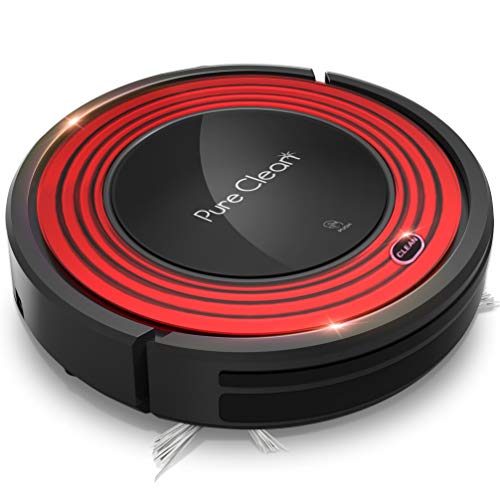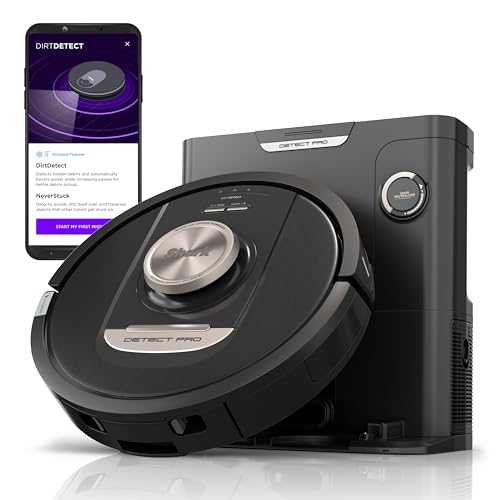It's The Ugly Truth About Robot Vacuum
페이지 정보
작성자 Verona Mansom 댓글 0건 조회 107회 작성일 24-06-11 03:28본문
 How to Find the Best Robot Vacuum
How to Find the Best Robot VacuumIf you're able to live without the benefits of smart features like mapping, and you don't mind emptying the garbage bin every 60 days or then, a basic robot vacuum will probably work for you. Choose a model with a clean base that works with voice assistants.
It is the best robo-vacuum we have tested in cleaning up pet hair on tiles, hardwood floors, and carpeting with low pile. It also has the ability to map out and create virtual no go zones for rooms or areas.
1. Powerful Suction
A robot vacuum that cleans and mops can keep on top of the dust, pet hair and dander that build up on your floors on a day-to-day basis. It also can reduce how often you need to clean your floors, saving your time and effort. The most effective models have powerful suction that will easily take on the most difficult messes and leave your home sparkling clean.
You can take care of more space with a robot vacuum and mop, which can be useful if you have a large home. Find models that have water reservoirs either built into its chassis or as a separate piece that you can swap out when vacuuming is complete. You'll need to empty and refill it, however, so this is an additional task that requires some extra effort on your part.
In the ideal world, you'd clean your floors prior to using your robot vacuum to keep it from hitting things. However, in the majority of homes, this isn't possible or desirable. Most models allow you to make use of an app for your smartphone to build virtual barriers that the robot can detect. Some models include no-go areas that you can mark areas you don't wish it to be allowed to enter. For example the child's room or a pile of cords in a corner.
This model is a good option if you're looking for a basic robot cleaner that does not have all the bells and whistles. It's quiet and is able to work on hard floors as well as carpets with low pile and can be programmed using the app to mop and vacuum at your leisure. It has a long battery life, which can last for up to 180 minutes before it requires to recharge.
2. Easy to Operate
In general robot vacuums require little input from you. They make use of navigation tools such as sensors and lasers to maneuver around obstacles and remove dust, food crumbs and pet hair from hard floors, tiles carpets, hardwood floors and low-pile carpets. Many have boundary strips that allow them to stay within the walls of a room while pricier models can be set to automatically wake up and begin cleaning at a predetermined time. Some even have fall-detection technology that helps them avoid tumbling down stairs or getting caught in electrical cords.
If you'd like to control your robot vacuum from the comfort of a couch, look for models that can work with voice assistants like Alexa and Google Assistant. You can also look for models that connect to Wi-Fi and allow you to start a cleaning session from anywhere using an app. You may want to select one with an extremely long-lasting battery as well as a large dustbin, depending on the size of your house.
Certain robot vacuums are also mopping machines. They make use of water reservoirs to wash the floor. This is ideal for mopping, but not ideal for difficult messes such as pet poop or other wet spills. You can select hybrids that have a removable microfiber mopping pad or a self-emptying model that allows you to stay for up to 60 days without emptying the base.
3. Smart Mapping
Certain robots utilize advanced mapping technology to build a detailed map as they clean. This makes it easier to avoid bumping into furniture and tripping on cords or chair legs. This feature is typically only available on higher-end models, but it's one of the most effective ways to ensure your robot has a complete understanding of the layout of your home and can determine where to go when it's running out of battery.
Most robots let you create virtual barriers. This can be done through an application or even physical boundary strips. This allows you to create zones that you don't want your robot explore, so that it can focus its attention on the areas and rooms that require the most cleaning.
Many robots also have the ability to automatically navigate to different floorings depending on the floor they're cleaning, whether that's switching between hard flooring and carpet or focusing on particular areas of your home, like corners and baseboards. This feature proved to be effective in our tests and improved the performance of the vacuum on hardwood flooring and low-pile floor carpeting. However, it's still important to secure furniture and cords before using your robot vacuum to ensure that it doesn't become stuck or get into something it shouldn't.
4. Remote Control
The majority of robot vacuums are WiFi-connected and can be controlled by Amazon Alexa, Google Assistant and Siri Shortcuts that enable you to control them using voice commands or from your smartphone. Many robot vacuums connect to smart home systems, and can create an outline of the area they clean after each session. This lets them "learn" how your home is laid out and plan more efficient routes during future cleaning sessions. There are also built-in obstacles avoidance that stops them from crashing into and damaging furniture or getting stuck on things like loose charging cables or shoe laces, as well as pet hair.
Most robots come with a remote you can use to steer them around your home. However, many can be controlled using a mobile app, which gives you more options. You can create multiple cleaning schedules and create an agenda of your most-loved rooms. You can also manually guide the robot by using direction arrows.
Certain models have no-go zones that are virtual barriers you can create within the app to prevent the robot from entering certain areas (like kids' toys or dog beds and bowls). Other apps let you set up a map of your home and provide the robot with precise information about your floors. The app that we recommend as our top pick one, the Roborock S7+, has a lot of useful options to help you clean your home, however its interface isn't as polished as the ones from iRobot and Shark.
5. Long Battery Life
Robotic vacs that can clean all over your home without stopping to recharge or empty their dust bins can save you time and energy. Certain robot vacuums can work with smart home devices like Alexa, Google Assistant, and Siri Shortcuts to allow hands-free operation. They can also make a map of the space to allow you to program them for certain areas or rooms and to avoid obstacles.
The majority of robot vacuums can detect objects, but the iRobot j7 comes with advanced features such as "home mapping" and obstacle avoidance. These can simplify your life (although one of our test robots did "eat" a few socks). If you're seeking to improve your home maintenance, you should consider a robot mop with water containers that can be filled and then empty.
While none of the models we tested can match the dirt-picking power of a stand-up vacuum the majority of them do an excellent job at cleaning hard floors and low-pile carpets. They are great in sweeping up dust and food dust, tracked-in dirt, and pet hair. They are also able to handle nuts and screws made of metal, as well as cats' litter. The best robot vacs can effortlessly work around furniture and are great at cleaning edges and corners as well. For a basic model that works on its own and is relatively inexpensive, check out the Eufy 11S.
6. Convenient Self-Charging
 A robot vacuum will help keep your home tidy and clean without doing much work. You can schedule your cleanings using the app and create no-go zones so that your robot doesn't damage your plants or your favorite chair. Many of our top picks automatically empty their bins and clean their docking stations for you.
A robot vacuum will help keep your home tidy and clean without doing much work. You can schedule your cleanings using the app and create no-go zones so that your robot doesn't damage your plants or your favorite chair. Many of our top picks automatically empty their bins and clean their docking stations for you.The best floor vacuum and mop (look at these guys) robot vacuums can be programmed to clean your floors regularly for months or even weeks at a stretch, freeing you from the tedious chore of manually mopping and sweeping your floors on a daily or weekly basis. This helps you spend more time doing things you enjoy and reduces the amount of time your floors need to be cleaned manually.
In the course of testing, the Q Revo was able to capture tiny particles such as baking soda and oatmeal, heavier debris such as nails and screws made of steel, and fluffy stuff such as pet hair. It's not equipped with the sophisticated mapping and objects avoidance features of our top picks, but it works well enough for most families.
The j7's best feature is its ability to recognize and avoid obstacles like power cords, shoes and socks and pet waste. This means that you don't need to clean up before using your robot. However, messy rooms can cause your robot to become stuck and perform a poor job.
- 이전글The engine control module (ECM), also known as the powertrain control module (PCM) or engine control unit (ECU), is a critical component of modern vehicles. 24.06.11
- 다음글The engine control module (ECM) in the BMW M5 is a highly advanced and sophisticated piece of technology that plays a crucial role in the overall performance and efficiency of the vehicle. 24.06.11
댓글목록
등록된 댓글이 없습니다.